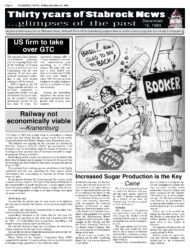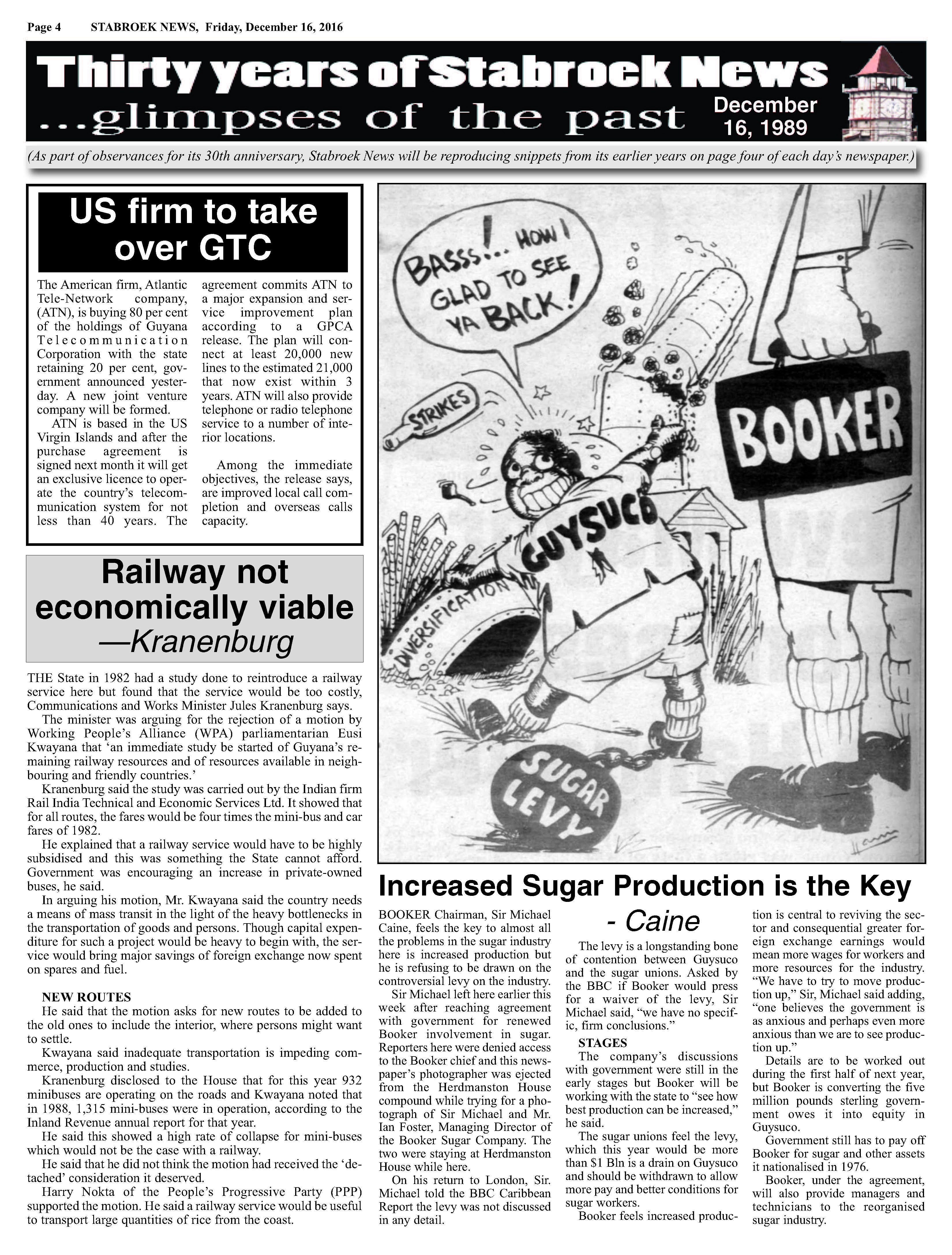The American firm, Atlantic Tele-Network company, (ATN), is buying 80 per cent of the holdings of Guyana Telecommunication Corporation with the state retaining 20 per cent, government announced yesterday. A new joint venture company will be formed.
ATN is based in the US Virgin Islands and after the purchase agreement is signed next month it will get an exclusive licence to operate the country’s telecommunication system for not less than 40 years. The agreement commits ATN to a major expansion and service improvement plan according to a GPCA release. The plan will connect at least 20,000 new lines to the estimated 21,000 that now exist within 3 years. ATN will also provide telephone or radio telephone service to a number of interior locations.
Among the immediate objectives, the release says, are improved local call completion and overseas calls capacity.
Railway not economically viable
—Kranenburg
 THE State in 1982 had a study done to reintroduce a railway service here but found that the service would be too costly, Communications and Works Minister Jules Kranenburg says.
THE State in 1982 had a study done to reintroduce a railway service here but found that the service would be too costly, Communications and Works Minister Jules Kranenburg says.
The minister was arguing for the rejection of a motion by Working People’s Alliance (WPA) parliamentarian Eusi Kwayana that ‘an immediate study be started of Guyana’s remaining railway resources and of resources available in neighbouring and friendly countries.’
Kranenburg said the study was carried out by the Indian firm Rail India Technical and Economic Services Ltd. It showed that for all routes, the fares would be four times the mini-bus and car fares of 1982.
He explained that a railway service would have to be highly subsidised and this was something the State cannot afford. Government was encouraging an increase in private-owned buses, he said.
In arguing his motion, Mr. Kwayana said the country needs a means of mass transit in the light of the heavy bottlenecks in the transportation of goods and persons. Though capital expenditure for such a project would be heavy to begin with, the service would bring major savings of foreign exchange now spent on spares and fuel.
NEW ROUTES
He said that the motion asks for new routes to be added to the old ones to include the interior, where persons might want to settle.
Kwayana said inadequate transportation is impeding commerce, production and studies.
Kranenburg disclosed to the House that for this year 932 minibuses are operating on the roads and Kwayana noted that in 1988, 1,315 mini-buses were in operation, according to the Inland Revenue annual report for that year.
He said this showed a high rate of collapse for mini-buses which would not be the case with a railway.
He said that he did not think the motion had received the ‘detached’ consideration it deserved.
Harry Nokta of the People’s Progressive Party (PPP) supported the motion. He said a railway service would be useful to transport large quantities of rice from the coast.
Increased Sugar Production is the Key
– Caine
BOOKER Chairman, Sir Michael Caine, feels the key to almost all the problems in the sugar industry here is increased production but he is refusing to be drawn on the controversial levy on the industry.
Sir Michael left here earlier this week after reaching agreement with government for renewed Booker involvement in sugar. Reporters here were denied access to the Booker chief and this newspaper’s photographer was ejected from the Herdmanston House compound while trying for a photograph of Sir Michael and Mr. Ian Foster, Managing Director of the Booker Sugar Company. The two were staying at Herdmanston House while here.
On his return to London, Sir. Michael told the BBC Caribbean Report the levy was not discussed in any detail.
The levy is a longstanding bone of contention between Guysuco and the sugar unions. Asked by the BBC if Booker would press for a waiver of the levy, Sir Michael said, “we have no specific, firm conclusions.”
STAGES
The company’s discussions with government were still in the early stages but Booker will be working with the state to “see how best production can be increased,” he said.
The sugar unions feel the levy, which this year would be more than $1 Bln is a drain on Guysuco and should be withdrawn to allow more pay and better conditions for sugar workers.
Booker feels increased production is central to reviving the sector and consequential greater foreign exchange earnings would mean more wages for workers and more resources for the industry. “We have to try to move production up,” Sir, Michael said adding, “one believes the government is as anxious and perhaps even more anxious than we are to see production up.”
Details are to be worked out during the first half of next year, but Booker is converting the five million pounds sterling government owes it into equity in Guysuco.
Government still has to pay off Booker for sugar and other assets it nationalised in 1976.
Booker, under the agreement, will also provide managers and technicians to the reorganised sugar industry.





